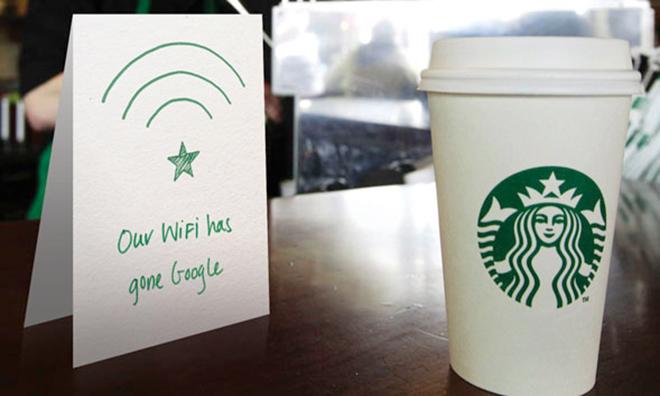Starbucks is switching away from AT&T and instead going with Google for the provision of free Wi-Fi service throughout its popular chain of coffeeshops, but the search giant's latest move into Internet service provision comes as critics are crying foul and saying it is abandoning net neutrality principles.
The switch was announced yesterday, according to The Wall Street Journal, which noted that Google will partner with Internet middleman Level 3 Communications to offer Starbucks customers Internet service about 10 times faster than the T1 connections currently provided by AT&T. AT&T will still supply Starbucks stores with assorted business services, but Starbucks' customers will no longer have AT&T-branded Internet access.
AT&T reportedly offered to upgrade its service to match its competitor's speed, but that offer was turned down for unknown reasons.
The new service will show up in some stores in beginning next week, though the report does not detail which locations. Over the next 18 months, though, all 7,000 of Starbucks' coffeeshops across the United States will eventually switch to the Level 3/Google service.
Representatives from Level 3 say that its company will "do the network stuff," while Google "will do what it does best in that relationship." Terms of the deal between the three firms have not been disclosed.
The Starbucks deal represents yet another of Google's continuing moves into the Internet service segment. Already, the search giant has become a service provider in limited areas with Google Fiber, a fiber-optic Internet service. That service debuted in the Kansas City metro area last year, but Google has confirmed that it will soon expand to Austin Texas.
Its move into service provision has rattled some of the industry's larger players, leaving cable companies in areas where Google Fiber currently exists or will exist soon scrambling to bump up speeds for their own customers. As Google becomes a larger player in that segment, though, critics are claiming that the company is abandoning some of the principles that the company has long stood by.
The Terms of Service for Google Fiber explicitly inform users that they "should not host any type of server using [a] Google Fiber connection," use the service to provide a large number of people with Internet access, or to provide commercial services to third parties. Some users have complained that this clause violates the Federal Communication's Open Internet Order, which prohibits fixed broadband providers from blocking lawful content, applications, services, and non-harmful devices.
Responding to the FCC's request for comment on allegations that Google was violating Net Neutrality rules, Google said that its terms do not in fact violate the Open Internet order. In a letter to the FCC — obtained by Wired — Google explained:
Google Fiber’s server policy is an aspect of “reasonable network management†that the Open Internet Order and Rules specifically permit. Mr. McClendon appears to allege that Google Fiber’s server policy violates the prohibitions against “blocking†and/or “unreasonable discrimination." The Order, however, provides an exception in both instances for “reasonable network management.†As the Order explains, “[a] network management practice is reasonable if it is appropriate and tailored to achieving a legitimate network management purpose, taking into account the particular network architecture and technology of the broadband Internet access service.â€Google Fiber’s server policy is prototypical “reasonable network management,†with no discriminatory impact on any content, application, or service provider. The server policy has been established to account for the congestion management and network security needs of Google Fiber’s network architecture, particularly given that Google Fiber does not impose data caps on its users.
Blocking the hosting of servers on a network is standard policy among most Internet Service Providers, and usually for the very reasons Google cites in its explanation. Google's continued advocacy and activism in digital arenas, though, has made it a target of more critics, who claim that the server terms are just another violation of the company's motto: Don't Be Evil.
Responding further to the controversy, Google sent a comment to Ars Technica. The comment is as follows:
"Google is a strong supporter of the open Internet and our stance here hasn't changed. This is a standard practice of network management, and as we said in our filing, the policy does not prevent legal, noncommercial use of applications such as multi-player gaming, video-conferencing, and home security."
 Kevin Bostic
Kevin Bostic







-m.jpg)






 Malcolm Owen
Malcolm Owen
 Amber Neely
Amber Neely


 Christine McKee
Christine McKee

 Chip Loder
Chip Loder
 Marko Zivkovic
Marko Zivkovic









84 Comments
Yet another reason to avoid Starbucks. I'm a Peet's fan.
amazing how google has changed their position now they have to put their money where their mouth is...
FaceTime to mysteriously stop working at Starbucks...
[quote name="AppleInsider" url="/t/158830/google-to-become-official-starbucks-isp-as-critics-claim-net-neutrality-backpedal#post_2372162"] The Terms of Service for Google Fiber explicitly inform users that they "should not host any type of server using [a] Google Fiber connection," use the service to provide a large number of people with Internet access, or to provide commercial services to third parties. Some users have complained that this clause violates the Federal Communication's Open Internet Order, which prohibits fixed broadband providers from blocking lawful content, applications, services, and non-harmful devices. [B]Blocking the hosting of servers on a network is standard policy among most Internet Service Providers, and usually for the very reasons Google cites in its explanation.[/B][/quote] That's really all AI really had to say and they're absolutely correct. It's a standard policy for every ISP that I can think of. It's hardly an issue of "net neutrality". Google has a discussion thread here where they explain it to their service users more clearly: http://productforums.google.com/forum/#!topic/fiber/-ixejP9yHj4
[quote name="AppleInsider" url="/t/158830/google-to-become-official-starbucks-isp-as-critics-claim-net-neutrality-backpedal#post_2372162"]Its move into service provision has rattled some of the industry's larger players, leaving cable companies in areas where Google Fiber currently exists or will exist soon scrambling to bump up speeds for their own customers.[/quote] This is the only good thing Google has ever done.